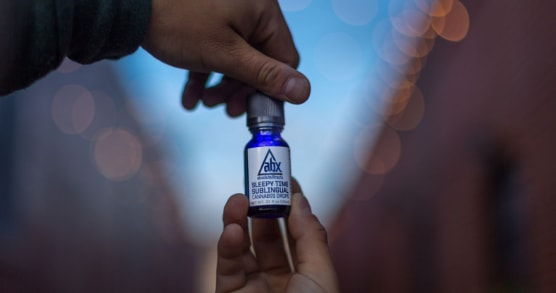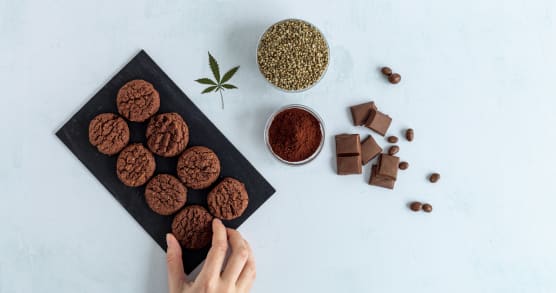Cannabinoids Explained: CBD
CBD is the second most common cannabinoid produced by the cannabis plant. Written by Anna Barberena.
CBD is the second most common cannabinoid produced by the cannabis plant. Cannabidiol was first extracted from the cannabis plant back in 1940 by Dr. Roger Adams. Then, in 1963 Dr. Raphael Mecholum isolated and identified the chemical structure of CBD. In 2018, the Farm Bill was passed which legalized the production of hemp in the U.S. Cannabis is defined as having more than 0.3% THC and hemp is defined as having less than 0.3% THC according to the Farm Bill.
CBD: A Non-intoxicating Cannabinoid
CBD does not produce a feeling of intoxication like its counterpart THC does. CBD does not actively bind to the CB1 or CB2 receptors but activates other pathways throughout the body to produce its effects (1). It is proving to be beneficial in treating a wide range of imbalances and medical issues. According to Dr. Ethan Russo, CBD has been shown to be effective in treating seizure disorders including epilepsy, inhibiting the growth and spread of cancer cells, improving insulin resistance, decreasing inflammation, decreasing anxiety and depression among many others. CBD concentrations in flowers are generally low because most breeders are focusing on THC, however that trend is beginning to change. You usually see concentrations range from 1% to 20%.

Therapeutic Effects of CBD
According to Dr. Ethan Russo, the Therapeutic Effects of CBD include:
- Anti-depressant
- Reduces nausea (antiemetic)
- Reduces seizures or convulsions (anticonvulsant)
- Reduces the risk of artery blockage
- Treats psoriasis
- Antipsychotic (reduces psychotic disorders)
- Antioxidant
- Reduces anxiety (anxiolytic)
- Bone stimulant
- Widens blood vessels which reduces blood pressure (vasorelaxant)
- Pain relief (analgesic)
- Anti-inflammatory
- Helpful with the prevention and treatment of diabetes

Entourage Effect
- When THC and CBD are consumed together, CBD reduces the intoxicating effect of THC while increasing THC’s therapeutic potential (2, 4)
Conditions CBD May Be Beneficial For:
- Anxiety and depression
- Chronic pain
- Neurodegenerative diseases
- Epilepsy and seizure disorders
- Psychosis and schizophrenia
- Glaucoma
- Addictions
- Brain injury
- Enhancing performance and recovery after exercising
- Sleep problems
- Psoriasis
- Arthritis
Potential Adverse Side Effects
- Low doses can increase energy
- High doses can be sedating
- Prescription drug interactions
Citations
- Sulak, Dustin. “The Pharmacology of Cannabis.” Medical Cannabis Core Curriculum, https://training.healer.com/.
- Pertwee, Roger G. “Cannabinoid pharmacology: the first 66 years.” British journal of pharmacology vol. 147 Suppl 1,Suppl 1 (2006): S163-71. doi:10.1038/sj.bjp.0706406
- Russo, Ethan, and Geoffrey W. Guy. “A Tale of Two Cannabinoids: The Therapeutic Rationale for Combining Tetrahydrocannabinol and Cannabidiol.” Medical Hypotheses, vol. 66, no. 2, Feb. 2006, pp. 234–246., https://doi.org/10.1016/j.mehy.2005.08.026.
References:
- Russo, Ethan B. “Taming THC: potential cannabis synergy and phytocannabinoid-terpenoid entourage effects.” British journal of pharmacology vol. 163,7 (2011): 1344-64. doi:10.1111/j.1476-5381.2011.01238.x
DISCLAIMER: THIS SITE DOES NOT PROVIDE MEDICAL ADVICE.
All information, including but not limited to, text, graphics, images and other materials contained on this site are for informational purposes only. No text, graphics, images or other materials on this site are intended to be professional medical advice or a substitute for professional medical advice, diagnosis or treatment. Always seek the advice of your physician or other qualified health care provider with any questions you may have regarding a medical condition or treatment and before undertaking a new health care regimen, and never disregard professional medical advice or delay in seeking professional medical advice because of something you have viewed on this site.
DISCLAIMER: THIS SITE DOES NOT PROVIDE MEDICAL ADVICE.
All information, including but not limited to, text, graphics, images and other materials contained on this site are for informational purposes only. No text, graphics, images or other materials on this site are intended to be professional medical advice or a substitute for professional medical advice, diagnosis or treatment. Always seek the advice of your physician or other qualified health care provider with any questions you may have regarding a medical condition or treatment and before undertaking a new health care regimen, and never disregard professional medical advice or delay in seeking professional medical advice because of something you have viewed on this site.



